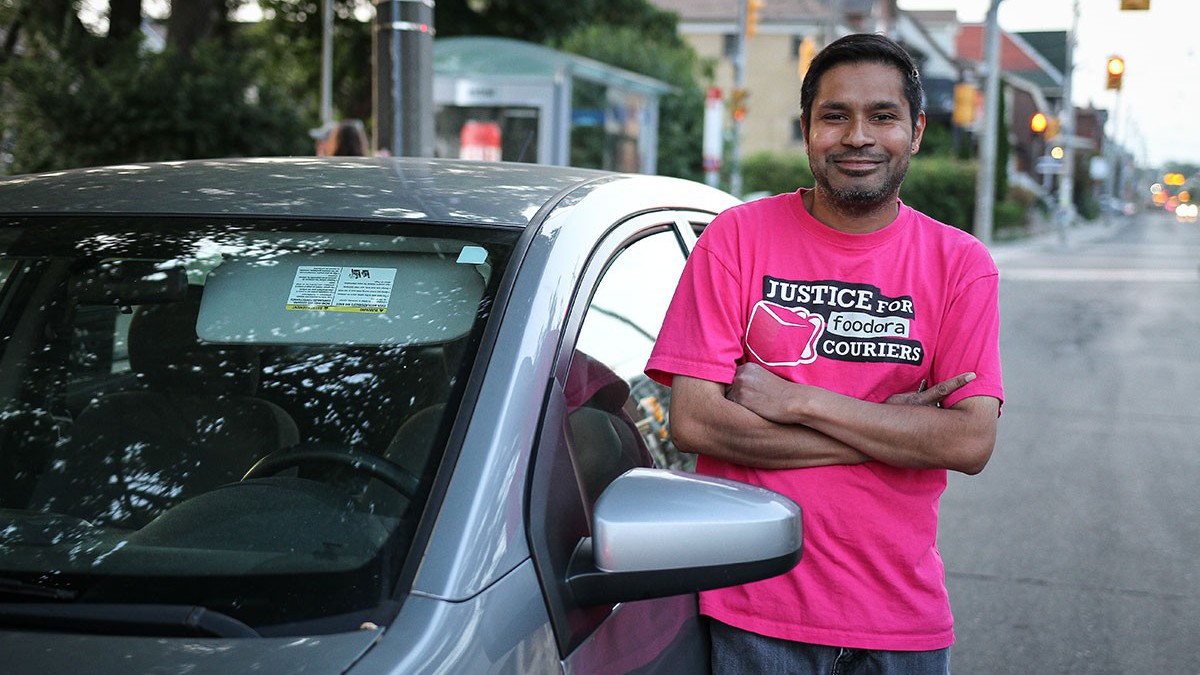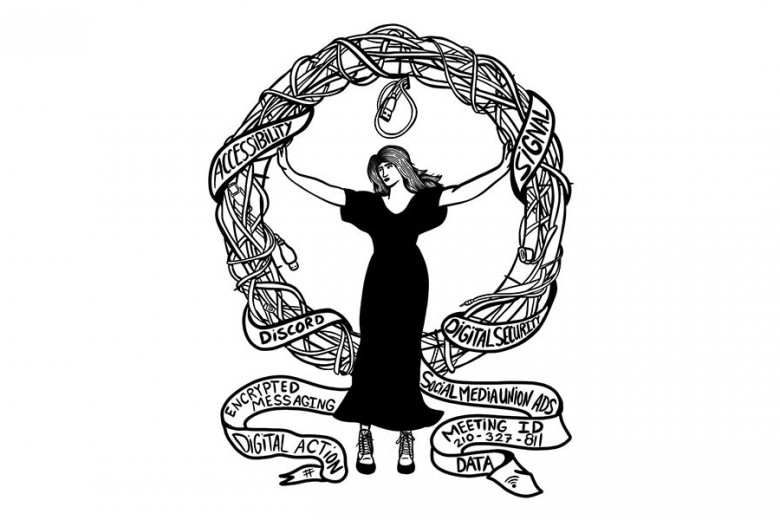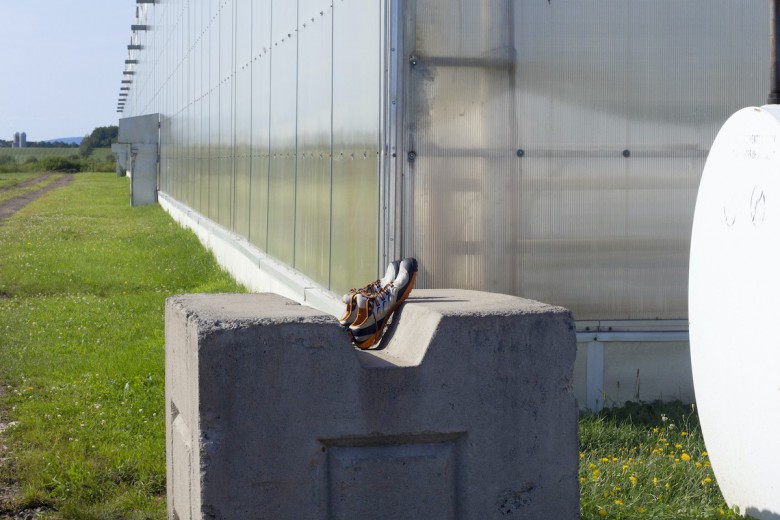In 2018, a group of food delivery couriers working for the app-based company Foodora gathered in a park in Toronto to talk about unionizing. The fire of collective action was lit, and over the next eight months, the campaign took off. In January of 2019, couriers joined up with the Canadian Union of Postal Workers (CUPW) and began quietly signing cards, running an underground campaign across the entire city. Faced with the challenge of organizing a workforce that was spread out across all parts of Toronto, Foodsters embraced old and new tactics, borrowing organizing strategies from both the labour movement and community struggles. Street outreach teams were trained to intercept couriers at busy restaurants and intersections. A steward system was developed to ensure couriers had a point of contact with the union, received phone calls and updates, and could have their questions answered.
In May of 2019, the campaign went public, organizing openly on the streets and online. Emboldened, street outreach teams sported bright pink “Justice for Foodora Couriers” shirts. Allies participated in the campaign through “order-in-days” – ordering food so they could talk to their courier about the union. Card signing increased and the list of Foodora couriers in the Greater Toronto Area was diligently built.
On July 31, 2019, Foodsters filed for certification at the Ontario Labour Relations Board with a feisty collective action: delivering the employer package straight to Foodora’s offices to look the boss in the eye. An e-vote took place in the second week of August. Ballot boxes were then sealed as CUPW and couriers headed to the labour board to battle it out over the next six months on the misclassification of couriers as “independent contractors.”
Foodsters United was born out of a creative, worker-driven union organizing campaign leading to historic firsts for the labour movement and the gig economy in Canada: the first union vote for gig workers, with almost 90 per cent voting in favour; a precedent-setting ruling by the Ontario Labour Relations Board that couriers are dependent contractors and have the right to unionize; and the first certification of a union local for gig workers.
Foodsters’ fight has massive implications for gig workers in Canada, and their wins have resonated deeply among precarious workers. As Foodsters were gearing up to negotiate for their first contract, Foodora abruptly left the Canadian market in May 2020, in the middle of the pandemic.
Here we talk to five worker leaders in Foodsters United and the Justice for Foodora Couriers campaign: Alex, Houston, Narada, Jogil, and Jennifer. They’re riders and drivers in Toronto who each joined the campaign at different times and were vital to its success.
Alex Kurth is a longtime bike courier in Toronto and a founder of Foodsters United.
Houston Gonsalves is a car courier, steward, and founder of the Foodsters United Drivers Committee.
Jennifer Scott is a longtime bike courier and organizer with Foodsters United.
Narada Kiondo is a bike courier who joined as the union vote was happening last August. He became a steward for Foodsters United and helped run the winter petition campaign.
Jogil Bermudez is a car courier and steward with the Drivers Committee. He was also involved in the winter petition campaign.
What does being a gig worker misclassified as an independent contractor mean in your daily life?
Jogil: It means our rights are exploited on a day-to-day basis because we are doing all the dangerous work. We are not being treated the way we should be treated. It seems like they’re manipulating the system so that they’re more in power over us even though there should be a balance of power.
Narada: It means I’m constantly in danger. I do not have access to benefits or rights. If I have a knee problem and I have to take time off, that will affect my income. If I was an employee, I could take care of myself more, knowing I had rights that other workers have.
What has it meant for you during the pandemic?
Houston: When it comes to the other delivery companies I’m with, there has been no shortage of work. I can pick up shifts 24/7 – which is why it’s also odd Foodora would have chosen that time to shut down, citing lack of profit. [But when I’m working,] the potential for infection is always there: someone at a restaurant getting too close, someone you are delivering to getting too close.
Alex: At the beginning it was very strange. The city seemed like a total ghost town. We didn’t know too much about how [COVID-19] spreads, so I was trying really hard not to touch door handles or elevator buttons. On the one hand, being able to do drop-offs where I don’t have to interact felt safer, but it also felt hostile. I don’t think it was targeted or malicious, but for a job that is already so insular, it felt even more removed from human interaction.
Narada: When CERB was first announced, independent contractors weren’t eligible until later.... It took a long time [for Uber, DoorDash, and SkipTheDishes] to give us the same sort of care they were giving customers. It was no skin off their back, because if one courier stopped working there were many others willing to risk their lives for no extra pay. I had no power as an individual to go up to Uber to ask for hazard pay.
Jennifer: Being classified as an “essential” worker during the pandemic felt like a betrayal. Members of government [spoke] about not wanting gig workers to fall [through] the cracks, while we went to work without any PPE [personal protective equipment] and no investment from our employers or local government to obtain any. Many did not qualify for CERB because of their immigration status while also not making enough money due to fewer shifts, lower tips, or not enough work.
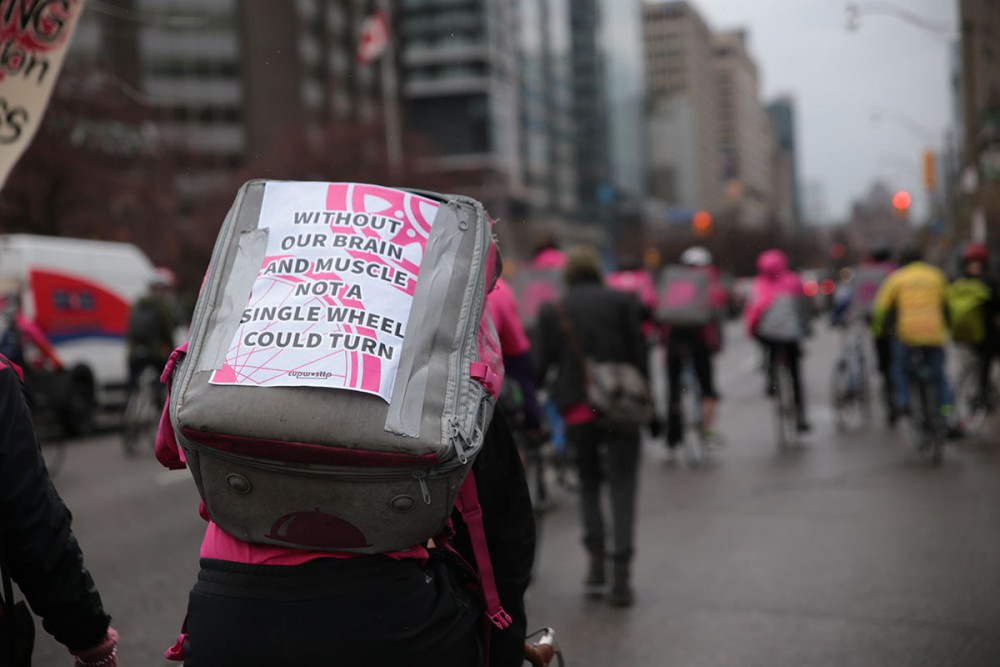
How did you first hear about the union, and what got you involved?
Alex: The seed of the idea was planted a long time ago, in the days when it was still Hurrier [Foodora bought Hurrier in 2015]. Every couple of months there would be an uproar. Inevitably people would say the “U” word, and others would say, “But we are independent contractors.” That changed at a certain point. I reached out to co-workers who had expressed disgruntlement in the past, whose views I knew. Everyone agreed to unionize. We started meeting in a park once a week. Ninety per cent of people we approached also agreed to unionize and would sign a card.
Jennifer: Waiting for an order outside, someone approached me. They asked how I felt about Foodora and our working conditions. We exchanged info and a short time later met to talk about unionizing. I got involved because I felt a need for representation of women within the workplace and the union.
Narada: I was doing courier work for Uber. Dropping off food, I saw a poster that said ”fix the gig economy.” When you start at Uber, they do a whole spiel: you’re an independent contractor, and that’s that. There’s no negotiation. Working my first shift, I started thinking about it and, like, they’re a multimillion-dollar company. Something didn’t sit with me. I started looking at all these articles coming out of the U.S., and the major complaints I heard from drivers was that it’s all well and good when you get your paycheque, but when you start adding up the costs – of buying and maintaining your bike or car, the costs to your health – they’re really selling you a lie. I hadn’t thought about it much because it was just a part-time job, until I saw the poster.
What were some of your favourite moments of this organizing?
Jogil: Street outreach, because you get to talk to other people. I personally have a fear of talking to strangers. But it’s fine because you get to connect with new people and really understand them. This is a great opportunity to share available resources that would improve their experience as a courier.
Jennifer: The ones I’ve spent with others: sitting on the curb in front of 7-Eleven late on summer nights talking about the future and a version of Foodora that is better for workers; standing in a room full of people who don’t know each other but who are willing to trust in each other as they speak openly about the precarity of life as a gig worker; the hearings at the labour board and the audible snorts or chuckles from the couriers in the room as we listen to our boss devalue our work, and the validation of knowing we were not the only ones in that room to see through it.
Houston: Sitting there and meeting people at those meetings, learning what they’ve gone through. Being part of the labour board proceedings and getting to testify. May Day was fun, I recall being in my car with my hazards on, rolling along with dozens and dozens of cyclists.
Narada: Myself and a bunch of stewards and other volunteers were in a room doing our calls – we’d been doing outreach on a [petition] campaign for weeks at that point – and we get a message saying that … we had won the court battle on misclassification. The discovery that we had won, the discovery that all the hard work I’d been doing, and all the hard work we’d all been doing, had paid off.
Alex: The day we went public. That was huge. That was, like, the best feeling. Having a huge, huge crowd of people come together and do a big ride, a big protest outside the office, everyone wearing union shirts, carrying banners, just a giant group ride through the city. It really felt like the culmination. It had been a year of work at that point, and it was a huge payoff.
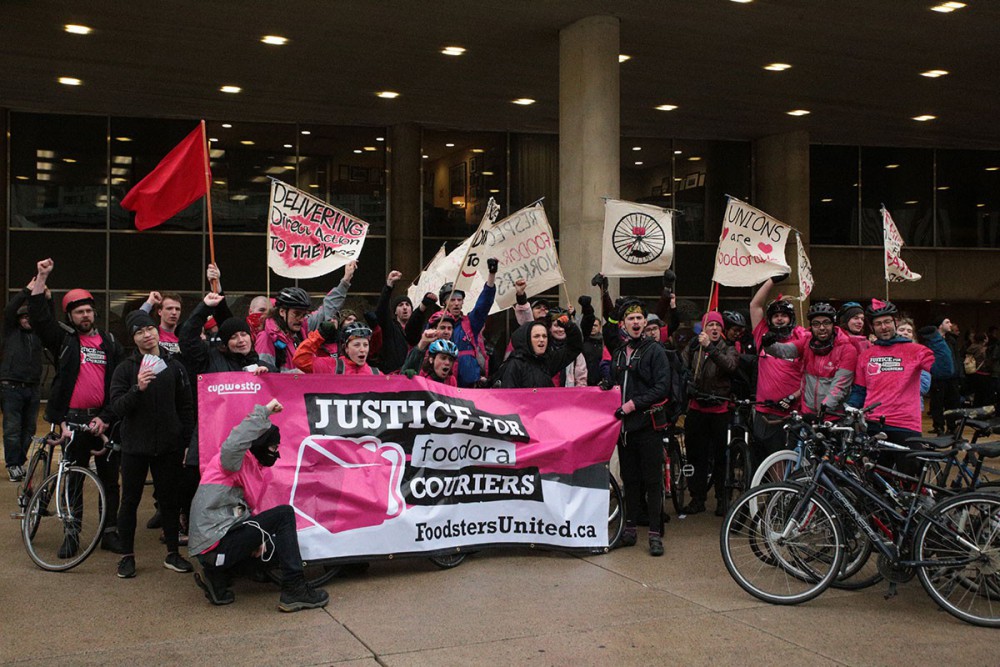
What would you want to do differently next time?
Narada: There should have been a better way to educate people on how they could be helpful … mentoring, getting people comfortable doing union work for the first time.
Jennifer: I would like to ensure that I prioritize the workers who experience the most harm. That I work toward more effectively supporting and uplifting the voices of those who are under-represented within the union.
Alex: There were a lot of arguments [we had] that I feel like we could have all handled a little better and kept in mind that we are all comrades and all have the same goal and assumed the best of each other.
What has Foodora’s exit meant for you?
Jennifer: I’ve spent the months since [Foodora’s exit] working to support and help the people most affected by that. People who still can’t find jobs to replace their work at Foodora during a global pandemic. People who couldn’t pay rent or who sacrificed groceries to pay rent. People without the ability to work. People who cannot access CERB. The day after Foodora’s announcement [that they were leaving Canada], Delivery Hero publicly celebrated making billions of euros in their most profitable quarter yet. Is there a word to describe that?
Narada: When summer hits, you have to have as many options as possible, you have to jump from app to app, sometimes you have to double-app. Foodora’s exit has meant one less option. It’s also changed the energy of the people in the community. Everybody in the community saw this decision by Foodora to exit and honestly it allowed for a lot of room for fear and doubt.
Alex: It’s incredibly disappointing. To have Foodora operating as a unionized workforce was something I would have really liked to have seen. It could have been a model to show other workers what a unionized gig economy could be…. To see those dreams dashed was really disheartening. At first I didn’t even have time to mourn or reflect, it was really about “are people going to be okay?” Now I am able to be more reflective … and I feel disappointed, but still feel like there were great things achieved, that we have set the foundation for things to come.
What do you see as the future for Foodsters United?
Narada: Let me tell you … Foodsters United, throughout its existence, from formation to this day, has never been a certified union, but even so it has been a force for good. It has improved working conditions even without the power of a collective agreement. Even in the face of Foodora’s exit, Foodsters have still been able to push for protections, especially during the pandemic, for couriers in general. So what I see is that Foodsters United has set a precedent and shown that it’s possible to fight a giant multinational corporation and win. It has shown that winning is possible.
Houston: Everyone seems to be very committed to push forward to help with other potential unions, teaming up with workers at other companies. It doesn’t look like we’ve gone anywhere. It doesn’t look like we are done.
Jennifer: Shall we create our own co-op? Fight for legislation that represents us? Unionize our workplaces? Maintain a community that uplifts and supports each of us? I can’t imagine where the possibility of all of those actions will take us, but I am excited to find out.
Jogil: The future that I see with Foodsters United is seeing all the gig workers united as one and having all these corporate companies [being held] accountable to all the actions they take.
Alex: Expanding the fight to unionize the gig economy to other companies has always been a goal of this campaign. Whether through trying to become certified or trying to find other ways to exert pressure on these companies – [like] petitioning the government to improve laws around gig workers, because we can’t keep doing this company by company. The gig economy is so much bigger … we need something that can encompass it all.
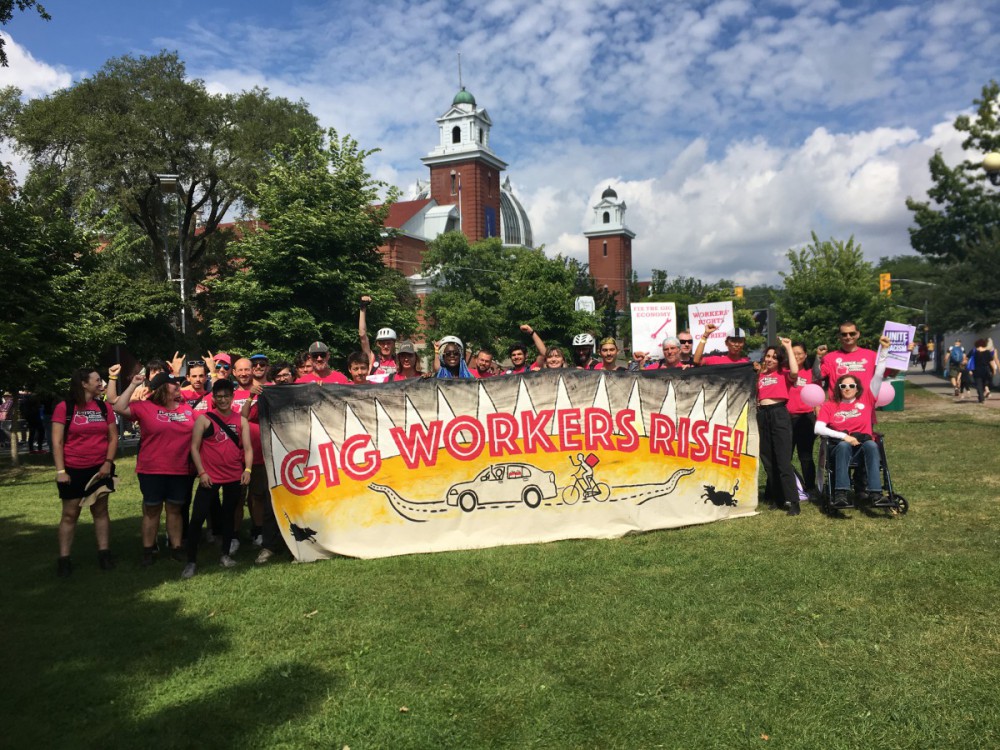
What message would you like to send to other gig workers and precarious workers?
Alex: You’re stronger than you might think. Don’t let them tell you that you are an independent contractor when you are doing THEIR work.
Jennifer: Gig workers are fighting to change our work and the way it impacts our lives. As Liisa Schofield said at our rally in front of the Foodora office, “Ideas transcend borders.” There are gig workers all over the world, fighting. Join us.
Jogil: If there’s a problem that you can see and you’re not being heard, and you think there are others that are not being heard, I suggest you create your own circle with other colleagues and find a way to get your voice heard.
Houston: You have rights. Don’t be scared to stand up and fight for some of those rights. We won. You can too.
Narada: Just because you’re misclassified, it doesn’t mean you’re an independent contractor. That has been proven false by our campaign.
What message would you like to send to the broader labour movement?
Alex: The gig economy is a large and ever-growing sector of the workers and it needs to be organized. But it’s not going to happen with traditional models and traditional tactics, so it needs to be creative and the fight against it needs to be a priority.
Jennifer: In life post-COVID-19, we may see many people who are not used to working precariously lose the security they once had with their employment. I think we will see traditional employers disrupt labour standards the way gig employers have been. Gig workers have been fighting and winning labour successes around the world for some time now. I think the broader labour movement can take lessons from gig workers and join us in changing the labour movement.
Narada: Unions need to be more focused and more in touch with the needs of the workers … more democratic. They need to spend more effort actually representing workers’ interests. And if they do that, they will have the support of not only the workforce but the broader community and this will actually lead to labour winning. Because labour has to win.
*
The battle is far from over. It will take years to unionize the gig economy. It will take years to reverse the erosion of workers’ rights that the tech lords have accelerated and exploited. As one chapter closes, another begins.
In the swirl of “opportunity” that characterizes this new post-Foodora landscape, some couriers will, hopefully, exit the gig economy to find a stable income that supports themselves and their families. Others will move on to other forms of precarious employment, stuck in a cycle of precarity in a sector of the economy that we’d been promised would liberate us from the chains of traditional employment.
In the gig economy, nothing is certain. In the era of COVID-19, this is even more true. The food delivery industry looks completely different today than it did a year ago, and a year from now it may be unrecognizable. It is important to remember here how the shortcomings of government regulation have allowed this sub-legal industry to flourish.
What this roundtable shows, and what couriers know, is that in our industry there has been no greater stabilizing force to counter the winds of precarity than that of solidarity, unity, and collective action. The way the word “solidarity” has re-entered the public lexicon since the pandemic first struck shows a public recognition of this truth.
The Foodsters campaign has been new and original in so many ways, but some of its lessons are as old as time. The many can overcome the few. The few will seek to evade justice.
These strange times call for a return to fundamentals: now is the time to build collective strength. Now is the time to use every instrument at our disposal to hold the profiteers to account.


